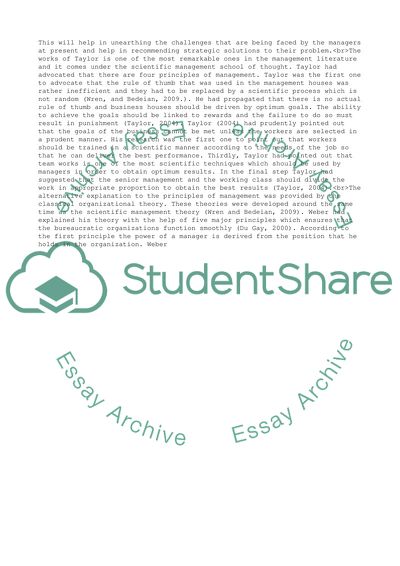Cite this document
(The Role of the Scientific Management Theory and the Classical Organizational Theory Essay Example | Topics and Well Written Essays - 3000 words, n.d.)
The Role of the Scientific Management Theory and the Classical Organizational Theory Essay Example | Topics and Well Written Essays - 3000 words. https://studentshare.org/management/1854953-to-what-extent-do-rational-perspectives-on-management-continue-to-dominate-and-are-they-still-relevant-to-contemporary-managers
The Role of the Scientific Management Theory and the Classical Organizational Theory Essay Example | Topics and Well Written Essays - 3000 words. https://studentshare.org/management/1854953-to-what-extent-do-rational-perspectives-on-management-continue-to-dominate-and-are-they-still-relevant-to-contemporary-managers
(The Role of the Scientific Management Theory and the Classical Organizational Theory Essay Example | Topics and Well Written Essays - 3000 Words)
The Role of the Scientific Management Theory and the Classical Organizational Theory Essay Example | Topics and Well Written Essays - 3000 Words. https://studentshare.org/management/1854953-to-what-extent-do-rational-perspectives-on-management-continue-to-dominate-and-are-they-still-relevant-to-contemporary-managers.
The Role of the Scientific Management Theory and the Classical Organizational Theory Essay Example | Topics and Well Written Essays - 3000 Words. https://studentshare.org/management/1854953-to-what-extent-do-rational-perspectives-on-management-continue-to-dominate-and-are-they-still-relevant-to-contemporary-managers.
“The Role of the Scientific Management Theory and the Classical Organizational Theory Essay Example | Topics and Well Written Essays - 3000 Words”. https://studentshare.org/management/1854953-to-what-extent-do-rational-perspectives-on-management-continue-to-dominate-and-are-they-still-relevant-to-contemporary-managers.


